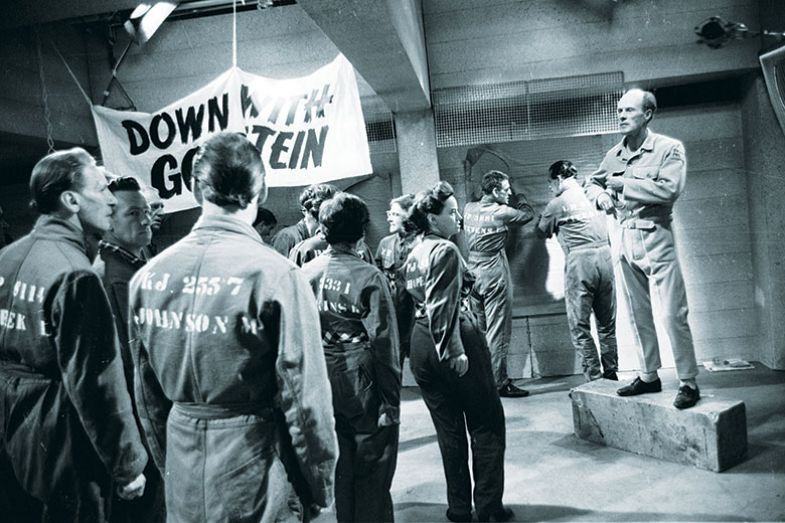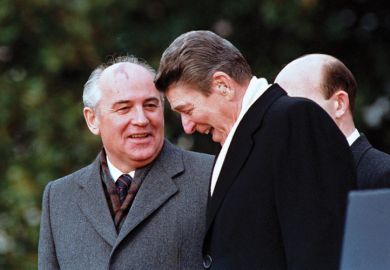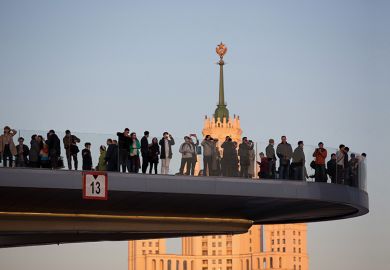In 1976, the Italian writer Italo Calvino delivered a talk at Amherst College, Massachusetts, under the title “Right and Wrong Political Uses of Literature”. He ruled against the idea “that literature should voice a truth already possessed by politics”, because literature thus becomes a mere ornament, a handmaiden to fixed ideas. Instead, he argued that literature only becomes useful politically “when it gives a voice to whatever is without a voice”, when it gives a name to “what the language of politics excludes”. In that scenario, novels, poems and plays become game changers.
I had these distinctions in mind while reading Duncan White’s fascinating history Cold Warriors, which tells numerous stories of the writers tied up in the East-West ideological warfare of the 20th century. White makes the gamechanger case for John le Carré’s The Spy Who Came In from the Cold (1963): “it altered the way people thought about the Cold War”. This is not, perhaps, the kind of book Calvino had in mind, but what le Carré did was to reveal forcefully to the world the disillusionment arising from his own experience of espionage (before he was le Carré, he was the spy David Cornwell): the hypocrisies, the moral compromises, the cynicism. As White points out, only Graham Greene’s The Quiet American (1955) had achieved something similar before.
We might see Aleksandr Solzhenitsyn’s One Day in the Life of Ivan Denisovich (1962), published during a brief thaw in Nikita Khrushchev’s rule, as a companion volume from the other side of the Iron Curtain. White describes how Russians queued for hours to get their hands on this revelatory account of a winter’s day in Stalin’s gulag. Books such as these –ones that had a tangible impact on Cold War thinking by capturing what the language of politics excludes – lie at the heart of his project. Other key texts in this respect are Anna Akhmatova’s Requiem (1963), a sequence of poems arising from the poet’s suffering during Stalin’s purges, Boris Pasternak’s Dr Zhivago (1957), Arthur Koestler’s Darkness at Noon (1940) and Václav Havel’s play The Garden Party (1963).
Cold Warriors celebrates the courage and creative power of these literary heroes, and others less well known. Hovering over them all like a kind of god is George Orwell. We see him in the Spanish Civil War, risking his life and then writing the definitive account of left-wing disillusionment in Homage to Catalonia (1938); we see him on the remote Hebridean island of Jura, suppressing tubercular coughing fits and hammering away at his typewriter to produce Nineteen Eighty-Four (1949).

The impact of that grimly potent imaginative act is hard to overestimate. It is a novel that, as White notes, was itself a major intervention in the Cold War. We might imagine Calvino damning the book as merely polemical; Milan Kundera did exactly that in The Art of the Novel (1986), complaining that “What Orwell tells us could have been said just as well (or even much better) in an essay or pamphlet.” But this overlooks the book’s imaginative power. Orwell’s horrific vision of a totalitarian future has a lasting impact that no essay or pamphlet can match. We remember the Two Minutes Hate, the rat torture and the breaking of Winston Smith as emotional experiences, not intellectual arguments.
White’s study makes clear the extent to which literary heroism in the Cold War was most marked in the Soviet Union – because it had to be. The adventures of Stephen Spender, Ernest Hemingway and Greene seem mere gallivanting when set alongside the persistence and suffering of Isaac Babel, Akhmatova, Pasternak and Solzhenitsyn (who appears as an almost-lunatic lone wolf in his defiance of the Soviet regime). Important among the lesser-known figures – at least to readers from the West – is Andrei Sinyavsky who, under the pseudonym Abram Tertz, wrote The Trial Begins (1960), a novel about Stalin’s antisemitic campaign, the Doctors’ Plot. Accused of “anti-Soviet activity” in 1965, Sinyavsky was put on trial and sentenced to seven years’ hard labour. All these writers kicked back against Socialist Realism, the Soviet literary creed that subjugated literature to Stalinist orthodoxy. They kept alive the notion of literature as a voice-giving force, defending that which the regime sought to exclude, suppress, brutalise and destroy.
Late in the narrative, a figure appears who is, uniquely, both a major contributor to the literary struggle and a successful politician: the Czech playwright and president Václav Havel. The spirited absurdism of his drama offers a counterweight to Orwell’s grim satire, ridiculing totalitarian bureaucracy; his major essay, “The Power of the Powerless”, offers an astute analysis of the ways the Warsaw Pact regimes functioned, and outlines the small acts of defiance that enable dissidents to “live within the truth”. When Havel became president during the Velvet Revolution of 1989, he brought writers, actors and directors into government and asked the Oscar-winning costume designer Theodor Pištěk to devise a new uniform for Prague’s Castle Guard. Those uniforms are a perfect symbol of Havel’s presidency: credible as military uniforms but also theatrical – they are ever so slightly over the top. In the same way, Havel combined political seriousness with a self-aware sense of the performative nature of government. This rare union of the political and the literary was, perhaps, the most optimistic thing to emerge from the end of the Cold War.
Cold Warriors is a far-reaching enterprise, with a large cast and many intertwined threads. White artfully constructs a gripping tale by deploying some novelistic arts of his own – think George Eliot or Leo Tolstoy. In the section on the Spanish Civil War, his narratives about Orwell, Koestler and Spender are plaited together: minor characters who feature in one thread pop up in another (Harry Pollitt, the general secretary of the British Communist Party, suspects Orwell’s politics in one, and recognises the propaganda value of Spender’s support in another), parallels and distinctions are made manifest (Spender doesn’t come off very well alongside Orwell) and the chapters often end with cliffhanger sentences such as this one: “Orwell was right to be paranoid; spies were everywhere. In fact, they were even closer than he thought.” This approach keeps us reading as we work through an extraordinary compendium of material. That said, the attributes that make Cold Warriors so good also make it unwieldy. It has 32 chapters arranged into eight sections, there are 57 pages of notes and it weighs two and a half pounds.
Parts of the book might have been trimmed, notably the extensive account of the KGB double agent Kim Philby. His story has been told elsewhere and White concedes that he is “not a literary figure at all”. His defence is that Philby’s story helps “clarify the way espionage and literature became so fascinatingly intertwined during the Cold War”, adding that “Philby did not write fiction; he lived it.” That is not entirely convincing. But this is to fuss around the edges of a mighty achievement. Cold Warriors is full of astonishing stories, remains highly readable, and throws down a challenge to literary critics to make use of, and respond to, this material in their own future work. It is not part of White’s project to offer literary analysis, but his work certainly paves the way for the scholars who will.
Andrew Palmer is principal lecturer in modern literature at Canterbury Christ Church University and co-author, with Sally Minogue, of The Remembered Dead: Poetry, Memory and the First World War (2018).
Cold Warriors: Writers Who Waged the Literary Cold War
By Duncan White
Little, Brown
752pp, £25.00
ISBN 9781408707999
Published 29 August 2019
The author
Duncan White, a lecturer in history and literature at Harvard University, was born in Bristol, England but spent much of his childhood in Hong Kong, Germany and Belgium. Although he enjoyed his time reading English at the University of Cambridge, he recalls, he felt that he graduated just as he had “started finding my intellectual feet. For that reason, I enrolled in an MA in Russian literature at UCL a couple of years later.” Although he wanted to work on Vladimir Nabokov, who became the subject of his DPhil at the University of Oxford and later his book Nabokov and His Books: Between Late Modernism and the Literary Marketplace (2017), “it was the class I took on Soviet-era fiction that really gripped me”.
Asked about other influences on his new book, White points to two things. The first was growing up in the 1980s as “a child of the late Cold War: I remember as a kid in West Germany not being allowed to drink fresh milk because of the fallout from the Chernobyl disaster and have vivid memories of watching the Berlin Wall come down on TV.” Equally formative was the way that, in studying and then teaching literature, he “became more and more interested in how fiction can make a social or political impact”.
As a journalist and regular book reviewer as well as an academic, White believes that “Watching my florid undergrad prose be ruthlessly pruned by a growling Fleet Street sub was the best of possible lessons. For many years, I was a sports reporter and that taught me not only how to write clearly and efficiently but also how to do so under intense deadline pressure. All of which proved invaluable to Cold Warriors, which with its layers of interlocking stories and over 70 years of history needed to be written with as much clarity as possible.”
Matthew Reisz
POSTSCRIPT:
Print headline: Unspeakable truth in fiction
Register to continue
Why register?
- Registration is free and only takes a moment
- Once registered, you can read 3 articles a month
- Sign up for our newsletter
Subscribe
Or subscribe for unlimited access to:
- Unlimited access to news, views, insights & reviews
- Digital editions
- Digital access to THE’s university and college rankings analysis
Already registered or a current subscriber?








